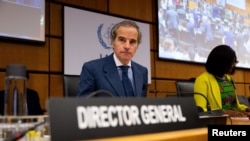Iranian Foreign Minister Arrives In Russia For Talks With Putin
Iranian Foreign Minister Abbas Araqchi has arrived in Moscow to hold talks with senior Russian leaders, including President Vladimir Putin.
Foreign Ministry spokeswoman Maria Zakharova told reporters on June 23 Araqchi would hold "a series of negotiations" during his visit.
Interfax, quoting Kremlin aide Yuri Ushakov, reported that Putin will meet with Araqchi at some point during the day.
Iran Warns 'Gambler' Trump Of Consequences Of Strikes On Nuclear Sites
A senior Iranian military official has warned that the recent US strikes had broadened the range of legitimate military targets for Tehran.
Ebrahim Zolfaqari, a spokesperson for Iran’s Khatam al-Anbiya Central Headquarters -- the country’s top operational command within its armed forces -- delivered the message in a video statement.
"Mr. Trump, the gambler, you may start this war, but we will be the ones to end it," Zolfaqari said in English at the end of his message.
Meanwhile, this just in from the IDF:
Iranian Foreign Minister Has Call With French Counterpart
Iranian Foreign Minister says he has spoken by phone with French Foreign Minister Jean-Noel Barrot. Abbas Araqchi said on his Telegram account that in his call he "strongly condemned the US's aggressive attack on peaceful nuclear facilities, calling this military action a violation of all international laws and regulations, including the United Nations Charter."
IAEA Chief Issues Stark Warning
Rafael Grossi, the head of the International Atomic Energy Agency, has urged all stakeholders in Iran to keep talking to each other and warned that the recent "dramatic events" could have "unthinkable" consequences if there is a "potential widening of the conflict.'"
"We have a window of opportunity to return to dialogue and diplomacy," he said in a statement. "If that window closes, violence and destruction could reach unthinkable levels and the global non-proliferation regime as we know it could crumble and fall."
Israel Says It's Hit More targets In Iran
Israel says its forces struck further targets in western Iran on June 23. The Israeli Air Force said in a statement that more than 15 fighter jets had attacked the Kermanshah region, “destroying a number of surface-to-surface missile launch and storage sites aimed toward Israeli territory.”
The air force also said that it attacked six airfields in central, eastern, and western Iran, “damaging runways, underground bunkers, a refueling plane, and three aircraft.
US Issues Terrorism Advisory After Strikes On Iranian Nuclear Sites
The US Department of Homeland Security has issued an advisory saying that while there are currently no specific credible threats "against the homeland," there is a "heightened threat environment" across the country after the US military launched strikes on three Iranian nuclear sites.
"The ongoing Israel-Iran conflict brings the possibility of increased threat to the homeland in the form of possible cyberattacks, acts of violence, and antisemitic hate crimes,” Homeland Secretary Kristi Noem said in a statement.
The advisory expires on September 22, it added.
Iran Must Negotiate Directly With US, Says German Foreign Minister
- By Reuters
Germany's foreign minister says that Iran needs to engage in direct talks with the United States following US strikes on Iranian nuclear facilities, though the European Union remains ready to play a role in negotiations.
"Iran says it only wants to negotiate with Europe and we see that as a good sign but we do also say that's not sufficient. We want to see the United States being involved," Johann Wadephul said in Brussels on June 23 ahead of a meeting of EU foreign ministers.
"I renew my call on Iran to now be ready for talks. We have, however, been asked by the US over the last few weeks and also just now, to remain in touch and Europe does have a role," he added.
'War Maker' Putin Cannot Mediate In Middle East, Ukrainian Foreign Minister Says
By RFE/RL's Ukrainian Service
Ukraine's foreign minister said that Russia cannot serve as a mediator in the Middle East conflict, as Iranian Foreign Minister Abbas Araqchi arrived in Moscow for talks with senior Russian leaders, including President Vladimir Putin.
"They cannot be any kind of mediator... [Putin] is a war maker. We have to keep that in mind. They must be pressured into peace," Andriy Sybiha told RFE/RL's Ukrainian Service on the sidelines of an EU foreign ministers meeting in Brussels.
Earlier this month, US President Donald Trump said that Putin had offered to help mediate the Middle East conflict during a phone call between the two leaders on June 14. "Let's mediate Russia first. You can worry about this later," Trump said he told Putin.
In remarks at the St Petersburg International Economic Forum on June 20, Putin referred to Tehran’s “legitimate right” to carry out uranium enrichment for civilian nuclear energy development but acknowledged what he called “Israel’s security concerns” over Iran’s nuclear ambitions.
The Strait Of Hormuz: What Is It And Why Does It Matter?
- By RFE/RL
By RFE/RL
Iranian lawmakers have been backing calls to close the Strait of Hormuz, a vital global trade route, where more than a fifth of the world’s oil supply passes every day.
Tehran has in the past threatened to close the strait, which would restrict trade and impact global oil prices, but has never followed through on the threat.
Although there is apparently consensus in Iran's parliament supporting the closure of the strait, the ultimate decision lies with the country's Supreme National Security Council.
Besides Iran, Saudi Arabia, Kuwait, and Iraq also rely on the narrow waterway to get their oil to China and other global markets.
The strait lies between Oman and Iran and links the Persian Gulf to the north with the Gulf of Oman to the south and the Arabian Sea beyond.
It is 33 kilometers wide at its narrowest point, and its shipping lane is just 3 kilometers wide.






